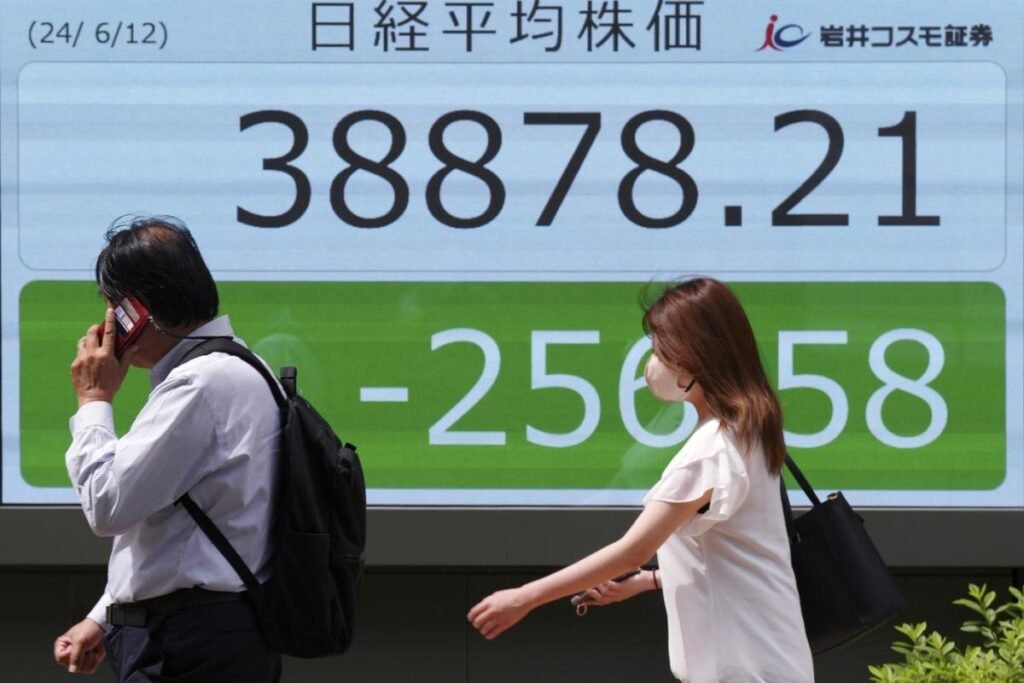BANGKOK (AP) — Asian stocks were mixed on Wednesday ahead of the U.S. Federal Reserve’s interest rate decision.
In Japan, rising inflation and falling wages are raising questions about how the central bank can move away from its zero interest rate policy. The Bank of Japan is due to announce its policy decision on Friday. In March, the bank raised its policy rate from minus 0.1 percent to a range of zero to 0.1 percent, its first rate hike in 17 years.
The government said producer prices rose 2.4% in May as the yen’s weakening against the U.S. dollar raised the cost of importing fuel and manufacturing parts. At the same time, the latest data showed that real wages, adjusted for inflation, fell for the 25th consecutive month in April.
The concern is that the Bank of Japan may refrain from raising interest rates out of fear that rising prices will curb consumer spending and have a negative impact on the broader economy.
Tokyo’s Nikkei stock average fell 0.7% to 38,876.71.
Hong Kong’s Hang Seng Index fell 1.3% to 17,946.46, while the Shanghai Composite Index rose 0.3% to 3,037.47.
Australia’s S&P/ASX 200 fell 0.5 percent to 7,715.50. In Bangkok, the SET was flat.
In South Korea, tech stocks rallied, helping lift stock prices, with the KOSPI rising 0.8% to 2,728.17. In Taiwan, the Taiex rose 1.2%.
Wall Street was in weak trading on Tuesday ahead of a key inflation report and Federal Reserve policy decision.
The S&P 500 rose 0.3% to 5,375.32, led by gains in technology stocks. The tech-heavy Nasdaq Composite Index rose 0.9% to 17,343.55. Both indexes hit record highs for the second straight day.
Apple shares surged 7.3% after the company highlighted its efforts in artificial intelligence technology.
The Dow Jones Industrial Average lagged the market, falling 120.62 points, or 0.3%, to 38,747.42.
Key events for the market this week are on Wednesday, when the US releases its latest data on consumer-level inflation and the Federal Reserve releases its latest data on interest rates. The US also releases its latest data on wholesale prices on Thursday.
Wall Street expects the government’s Consumer Price Index to remain unchanged at 3.4% in May. Inflation as measured by the CPI appears to be hovering around 3%, though that’s down significantly from a peak of 9.1% in 2022. That makes it harder for the Fed to achieve its goal of pushing inflation back to its 2% target.
The Fed has kept its key interest rate at its highest level in more than two decades, and Wall Street expects one or two rate cuts this year. Few expect the central bank to change its key rate at its meeting, which began on Tuesday. Policymakers are due to release their latest forecasts for interest rates and the economy on Wednesday.
When Fed officials last released their forecasts in March, they suggested a typical member expected roughly three rate cuts in 2024. That forecast will almost certainly be lower this time around.
Recent economic data has been mixed, with traders hoping for a moderate slowdown without a recession.
The economy remains resilient, supported by a strong job market and consumer spending. Consumers, especially those on lower incomes, are feeling increasingly stressed, and retailers are warning investors about the potential impact on revenues and incomes. The U.S. job market is showing signs of cooling, which may ease inflation but increase consumer stress.
Affirm Holdings, which offers a buy now, pay later service, rose 11% on news that the company would be integrated into Apple Pay.
Shares of Paramount Global, the media company that owns Paramount Film Studios, CBS and several cable networks, fell 7.8 percent after reports that merger talks between it and Skydance Media had collapsed.
In other trading early Wednesday, benchmark U.S. crude rose 58 cents to $78.48 a barrel in electronic trading on the New York Mercantile Exchange.
Brent crude, the international standard, rose 47 cents to $82.39 a barrel.
The U.S. dollar rose to 157.29 yen from 157.14 yen. The euro rose to 1.0745 dollars from 1.0740 dollars.
Elaine Kurtenbach, The Associated Press

